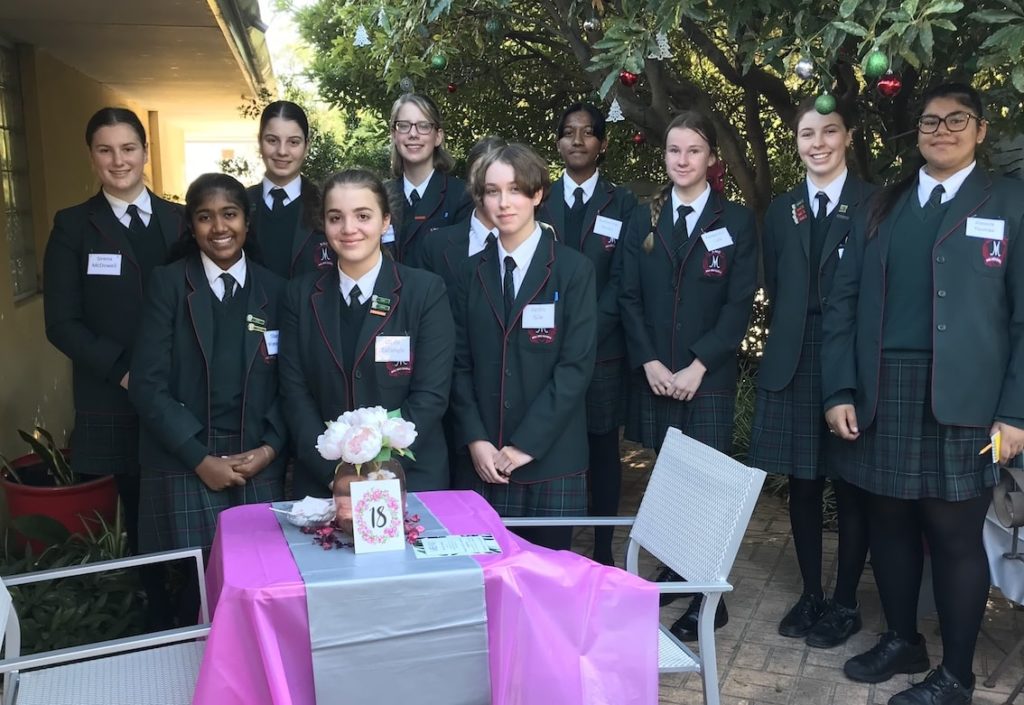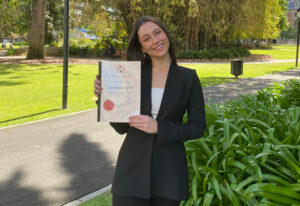
Each week, a number of our students head off to Carinya Nursing Home in Bicton to spend their afternoons with the elderly. They do this as part of the co-curricular service program. Most of the students find they take away far more from these visits than what they give.
We asked Year 9 student Claudia Cirocco and Year 7 student Anika Zammit about why they chose this activity and about their experiences.
Why did you choose aged care visits for your co-curricular activity?
Claudia: I chose aged care visits as one of my co-curricular activities because I really enjoy doing something different. I love doing the other service activities, but this co-curricular is special and beneficial in a different way as we are able to go out and give them our time rather than something materialistic.
Anika: I chose aged care visits because I used to go to a nursing home and all of the residents really enjoyed it when we came and played bingo or did something with them, especially when we took our dog as pet therapy. I really just wanted to do that and talk to all the residents.
What did you do during your visits?
Claudia: Most days we would sit and talk to the residents in the facility and sometimes if they had a function coming up we would help them, like folding napkins, handing out booklets and making folders of music.
Anika: During our visits to Carinya Nursing Home we would walk around and chat with the residents. There were lots of sitting rooms so often we would go to one of those to talk. Sometimes we would go into a resident’s room. Mainly it was just about conversing with the people there and listening to what they had to say.
Do you think it’s important for students to visit aged care facilities?
Claudia: I think it is important for students to visit aged care facilities because it has a big effect on the people in these facilities. They look forward to our visits and like to hear what we do at school. The residents are also always willing to talk about their life and have so much wisdom they would like to share.
Anika: I think it’s important for students to visit because some of the residents don’t get many visitors; they may not have family that are able to visit them and they may be lonely. It is also just really nice for them to talk to someone about whatever they like. I think that talking to one of the Santa Maria girls is the highlight of some of their days and they look forward to it each week.
Did you face any challenges and if so, how did you overcome them?
Claudia: We don’t really face many challenges when visiting but one that seems to remain consistent is when we first arrive. Everyone is a bit nervous talking to people we may have never talked to before. This is only a challenge until we break the ice and get to know them. This makes the visits much more enjoyable and beneficial.
Anika: Sometimes I felt really shy about going to visit because I didn’t know any people there. I think that the best thing to do in a situation like this is to just stick with a group when you first walk around until you find someone that you are really comfortable talking to. During my first visit, I met a really nice lady there and I went and talked to her every week after that because I felt happy talking to her.
What was the best thing about doing this activity?
Claudia: One of the best things about doing this activity is talking to the residents. They are always so friendly and love talking to us or just sitting and watching what’s on TV together. They love talking about their past and when they were our age, where they lived and their family. I also enjoy going out of school and visiting somewhere else rather than just being in a classroom.
Anika: The best thing about doing this co-curricular was just talking to the residents and relaxing, and you could see that they really enjoyed the time too. It was just nice being there and chatting and listening. Some of the people there had really interesting stories too!
What is one key thing you have gained from this co-curricular?
Claudia: One key thing I have gained from this co-curricular is that although it comes at little cost to me, it affects these people so much. Some residents may not get very many visitors and they enjoy our visits, which also makes all of us visiting feel good about what we are doing. I have also gained skills like communication, as everyone at the facility was at a different speaking level or may have a disability.
Anika: I think that one key thing that I have gained from doing the aged care visits was people skills. Sometimes I’m shy and I think that by going there and talking, you learn to be less shy and learn how to start conversations and things like that.









